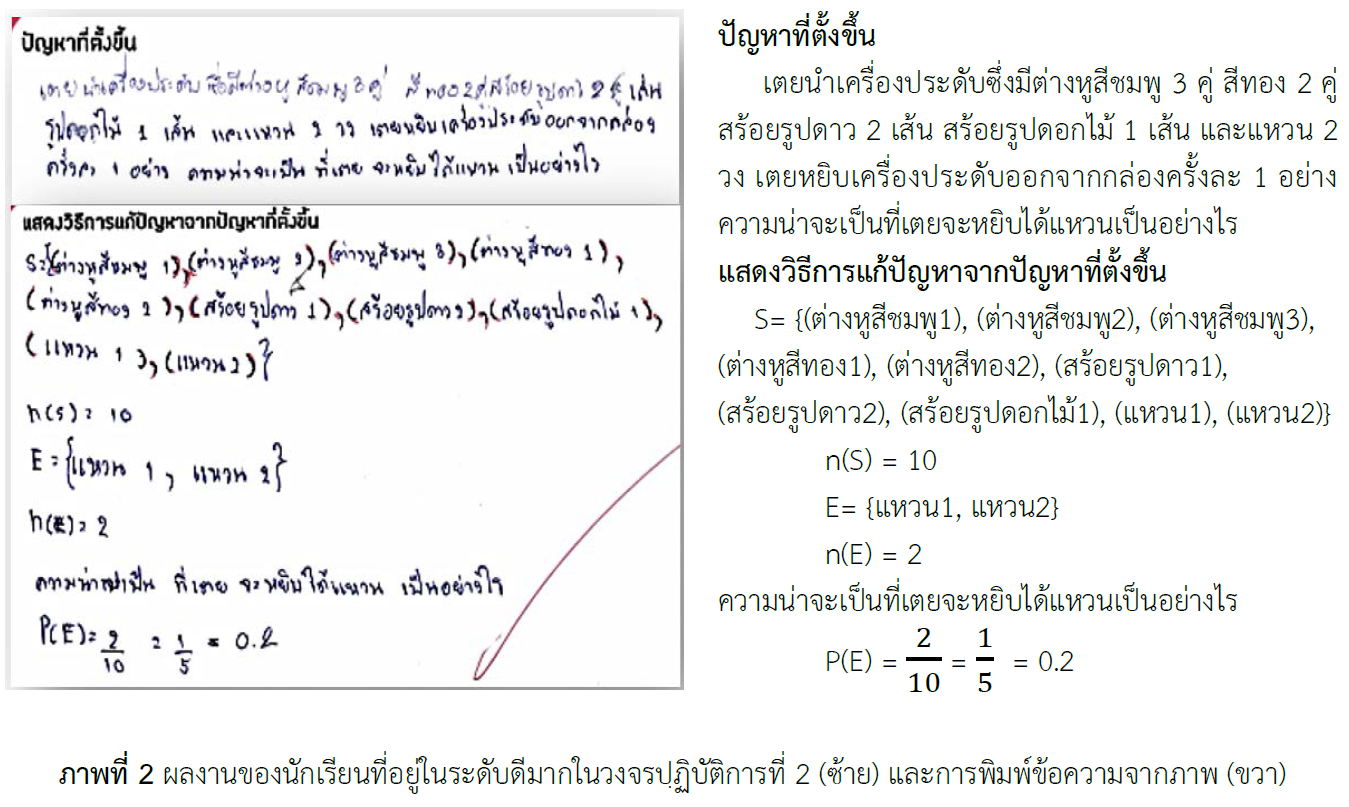การจัดการเรียนรู้โดยใช้ 5 แนวทางปฏิบัติในการสอนคณิตศาสตร์เพื่อส่งเสริมความสามารถในการตั้งปัญหาและการแก้ปัญหา เรื่อง ความน่าจะเป็น ของนักเรียนชั้นมัธยมศึกษาปีที่ 3
Main Article Content
บทคัดย่อ
การวิจัยครั้งนี้มีวัตถุประสงค์เพื่อ 1) ศึกษาแนวทางการจัดการเรียนรู้โดยใช้ 5 แนวทางปฏิบัติในการสอนคณิตศาสตร์ที่ส่งเสริมความสามารถในการตั้งปัญหาและการแก้ปัญหา 2) ศึกษาผลการจัดการเรียนรู้โดยใช้ 5 แนวทางปฏิบัติในการสอนคณิตศาสตร์ที่มีต่อความสามารถในการตั้งปัญหาและการแก้ปัญหา เรื่อง ความน่าจะเป็น สำหรับนักเรียนชั้นมัธยมศึกษาปีที่ 3 กลุ่มเป้าหมาย คือ นักเรียนจำนวน 20 คน โรงเรียนมัธยมศึกษาแห่งหนึ่งในจังหวัดนครสวรรค์ ผู้วิจัยใช้รูปแบบการวิจัยปฏิบัติการในชั้นเรียน จำนวน 3 วงจรปฏิบัติการ โดยใช้ระยะเวลาทั้งหมด 12 ชั่วโมง เครื่องมือที่ใช้ในงานวิจัย ได้แก่ แผนการจัดกิจกรรมการเรียนรู้ แบบสะท้อนผลการจัดการเรียนรู้ ใบกิจกรรม แบบบันทึกการตั้งปัญหาและการแก้ปัญหา และแบบทดสอบการตั้งปัญหาและการแก้ปัญหา ข้อมูลที่ได้จะนำมาวิเคราะห์ข้อมูลเชิงเนื้อหาและวิเคราะห์แบบแยกประเด็น ผลการวิจัย พบว่า 1) แนวทางการจัดการเรียนรู้โดยใช้ 5 แนวทางปฏิบัติในการสอนคณิตศาสตร์ที่ส่งเสริมความสามารถในการตั้งปัญหาและการแก้ปัญหานั้น มีประเด็นที่ควรเน้น คือ ครูควรเลือกงานทางคณิตศาสตร์หรือสถานการณ์ที่นำมาใช้ในการจัดการเรียนรู้ควรเป็นปัญหาหรือสถานการณ์ที่ช่วยกระตุ้นความสนใจของนักเรียน จึงจะช่วยให้เกิดการอภิปรายในชั้นเรียนและส่งผลต่อการตั้งปัญหาของนักเรียน ครูควรเลือกและเรียงลำดับผลงานของนักเรียนในการนำเสนอให้ตรงกับความหมายของความน่าจะเป็นจากน้อยที่สุดไปมากที่สุด จึงจะช่วยให้นักเรียนเรียนรู้จากข้อผิดพลาดจนสร้างความรู้ได้ด้วยตนเอง และครูควรเป็นผู้เริ่มการอภิปรายโดยยกตัวอย่างและใช้คำถามปลายเปิดประกอบตัวอย่างนั้น จึงจะช่วยให้นักเรียนเรียนรู้การสืบเสาะหาความรู้และอภิปรายร่วมกับเพื่อนในชั้นเรียน และ 2) นักเรียนส่วนใหญ่มีความสามารถในการตั้งปัญหาและแก้ปัญหาอยู่ในระดับดีมาก กล่าวคือ นักเรียนสามารถตั้งสถานการณ์หรือปัญหาเกี่ยวกับความน่าจะเป็น โดยกำหนดข้อมูล เงื่อนไข คำถามและสามารถทำความเข้าใจปัญหา เลือกยุทธวิธีการแก้ปัญหา ดำเนินการใช้ยุทธวิธีในการแก้ปัญหาด้วยวิธีที่เหมาะสม สรุปคำตอบและสรุปความคิดรวบยอดของความน่าจะเป็นได้
Article Details
วารสารวิทยาศาสตร์และวิทยาศาสตร์ศึกษา (JSSE) เป็นผู้ถือลิสิทธิ์บทความทุกบทความที่เผยแพร่ใน JSSE นี้ ทั้งนี้ ผู้เขียนจะต้องส่งแบบโอนลิขสิทธิ์บทความฉบับที่มีรายมือชื่อของผู้เขียนหลักหรือผู้ที่ได้รับมอบอำนาจแทนผู้เขียนทุกนให้กับ JSSE ก่อนที่บทความจะมีการเผยแพร่ผ่านเว็บไซต์ของวารสาร
แบบโอนลิขสิทธิ์บทความ (Copyright Transfer Form)
ทางวารสาร JSSE ได้กำหนดให้มีการกรอกแบบโอนลิขสิทธิ์บทความให้ครบถ้วนและส่งมายังกองบรรณาธิการในข้อมูลเสริม (supplementary data) พร้อมกับนิพนธ์ต้นฉบับ (manuscript) ที่ส่งมาขอรับการตีพิมพ์ ทั้งนี้ ผู้เขียนหลัก (corresponding authors) หรือผู้รับมอบอำนาจ (ในฐานะตัวแทนของผู้เขียนทุกคน) สามารถดำเนินการโอนลิขสิทธิ์บทความแทนผู้เขียนทั้งหมดได้ ซึ่งสามารถอัพโหลดไฟล์บทความต้นฉบับ (Manuscript) และไฟล์แบบโอนลิขสิทธิ์บทความ (Copyright Transfer Form) ในเมนู “Upload Submission” ดังนี้
1. อัพโหลดไฟล์บทความต้นฉบับ (Manuscript) ในเมนูย่อย Article Component > Article Text
2. อัพโหลดไฟล์แบบโอนลิขสิทธิ์บทความ (Copyright Transfer Form) ในเมนูย่อย Article Component > Other
ดาวน์โหลด ไฟล์แบบโอนลิขสิทธิ์บทความ (Copyright Transfer Form)
เอกสารอ้างอิง
Chinapong, P. (2014). Poll points out that children study the hardest in the world But not practical in addition, special education has to be done to reform (in Thai). Retrieved 16 April 2018. Form MGR online: https://mgronline.com/qol/detail/9570000045187
Cunningham, R.F. (2004). Problem Posing: An Opportunity for increasing student responsibility. Journal of Mathematics and Computer Education, 38(1), 83-89.
Ilana, L. and Atara, S. (2007). Problem posing as a means for developing mathematical knowledge of prospective teachers. In Proceedings of the 31st Conference of the International Group for the Psychology of Mathematics Education, 3, (pp.129-136). Seoul: PME.
Kamol, N. (2018). Suporting pre–service teachers in teaching mathematics through lesson study using five practices: A pilot study. In Proceedings of 8th ICMI-East Asia Regional Conference on Mathematics Education 7 – 11 May 2018 (pp. 493-501). Taipei: Taiwan.
Kemmis, S. and McTaggart, R. (2000). Participatory action research. In N. Denzin & Y. Lincoln (Eds.), Handbook of qualitative research (2nd ed., pp. 567–605). Thousand Oaks, CA: Sage.
Kwek, M.L. and Lye, W.L. (2007). Using problem – posing as an assessment tool. Retrieved 16 April 2018, from CiteSeerx: http://citeseerx.ist.psu.edu/viewdoc/summary?doi=10.1.1.535.1209
Maria, L. (2014). Incorporating the practice of arguing in stein et al.’s model for helping teachers plan and conduct productive whole-class discussions (pp. 97-106). In Ninth Research Seminar of the Swedish Society for Research in Mathematics Education (SMDF, MADIF-9). Umeå, Sweden: Umeå University.
Office of the Education Council. (2017). National education plan 2017 – 2036 (in Thai). Bangkok: Chili Sweet Graphic Co., Ltd.
Panich, W. (2012). A way to create learning for students in the 21st century (in Thai). Bangkok: Sosri-Saritwong Foundation.
Saythnu, S. (2017). Professional teachers, Quick professional teachers in the 21st Century (in Thai). Bangkok: Sosri-Saritwong Foundation.
Silver, E.A. and Cai, J. (1996). An Analysis of Arithmetic Problem Posing by Middle School Students. Journal for Research in Mathematics Education, 27(5), 521-539.
Smith, M.S. and Stein, M.K. (2011). 5 practices for orchestrating productive mathematics discussions. Reston, VA: NCTM.
The Institute for the Promotion of Teaching Science and Technology. (2012). Mathematics Evaluation assessment (in Thai). Bangkok: Se-Education Co., Ltd.
Wongpaibool, P. (2017). Active learning and learner engagement (Active Learning) (in Thai). Journal of Yanasangvorn Research Institute Mahamakut Buddhist University, 8(2), 327–336.


